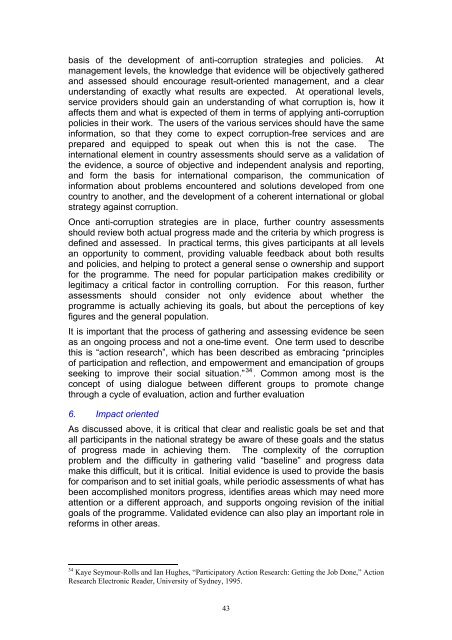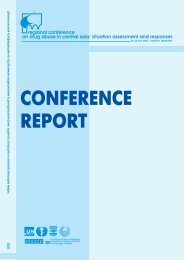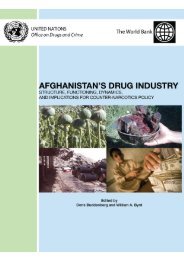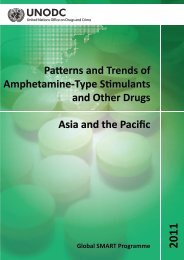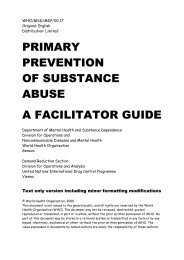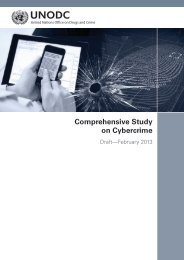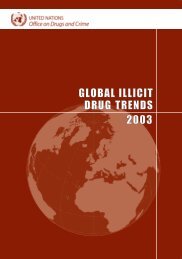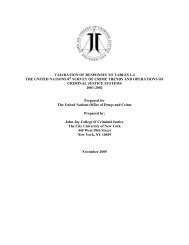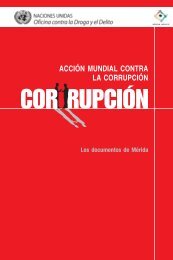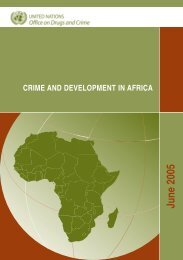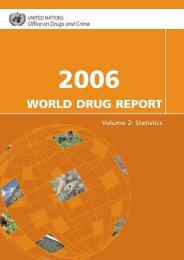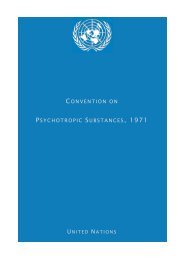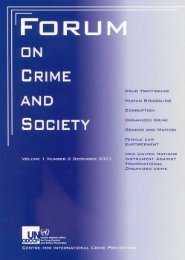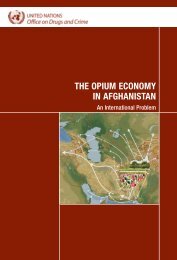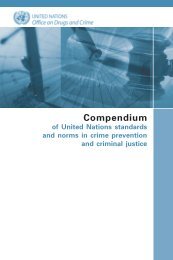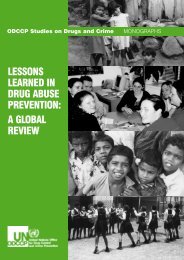UN Guide for Anti-Corruption Policies - United Nations Office on ...
UN Guide for Anti-Corruption Policies - United Nations Office on ...
UN Guide for Anti-Corruption Policies - United Nations Office on ...
You also want an ePaper? Increase the reach of your titles
YUMPU automatically turns print PDFs into web optimized ePapers that Google loves.
asis of the development of anti-corrupti<strong>on</strong> strategies and policies. At<br />
management levels, the knowledge that evidence will be objectively gathered<br />
and assessed should encourage result-oriented management, and a clear<br />
understanding of exactly what results are expected. At operati<strong>on</strong>al levels,<br />
service providers should gain an understanding of what corrupti<strong>on</strong> is, how it<br />
affects them and what is expected of them in terms of applying anti-corrupti<strong>on</strong><br />
policies in their work. The users of the various services should have the same<br />
in<str<strong>on</strong>g>for</str<strong>on</strong>g>mati<strong>on</strong>, so that they come to expect corrupti<strong>on</strong>-free services and are<br />
prepared and equipped to speak out when this is not the case. The<br />
internati<strong>on</strong>al element in country assessments should serve as a validati<strong>on</strong> of<br />
the evidence, a source of objective and independent analysis and reporting,<br />
and <str<strong>on</strong>g>for</str<strong>on</strong>g>m the basis <str<strong>on</strong>g>for</str<strong>on</strong>g> internati<strong>on</strong>al comparis<strong>on</strong>, the communicati<strong>on</strong> of<br />
in<str<strong>on</strong>g>for</str<strong>on</strong>g>mati<strong>on</strong> about problems encountered and soluti<strong>on</strong>s developed from <strong>on</strong>e<br />
country to another, and the development of a coherent internati<strong>on</strong>al or global<br />
strategy against corrupti<strong>on</strong>.<br />
Once anti-corrupti<strong>on</strong> strategies are in place, further country assessments<br />
should review both actual progress made and the criteria by which progress is<br />
defined and assessed. In practical terms, this gives participants at all levels<br />
an opportunity to comment, providing valuable feedback about both results<br />
and policies, and helping to protect a general sense o ownership and support<br />
<str<strong>on</strong>g>for</str<strong>on</strong>g> the programme. The need <str<strong>on</strong>g>for</str<strong>on</strong>g> popular participati<strong>on</strong> makes credibility or<br />
legitimacy a critical factor in c<strong>on</strong>trolling corrupti<strong>on</strong>. For this reas<strong>on</strong>, further<br />
assessments should c<strong>on</strong>sider not <strong>on</strong>ly evidence about whether the<br />
programme is actually achieving its goals, but about the percepti<strong>on</strong>s of key<br />
figures and the general populati<strong>on</strong>.<br />
It is important that the process of gathering and assessing evidence be seen<br />
as an <strong>on</strong>going process and not a <strong>on</strong>e-time event. One term used to describe<br />
this is “acti<strong>on</strong> research”, which has been described as embracing “principles<br />
of participati<strong>on</strong> and reflecti<strong>on</strong>, and empowerment and emancipati<strong>on</strong> of groups<br />
seeking to improve their social situati<strong>on</strong>.” 34 . Comm<strong>on</strong> am<strong>on</strong>g most is the<br />
c<strong>on</strong>cept of using dialogue between different groups to promote change<br />
through a cycle of evaluati<strong>on</strong>, acti<strong>on</strong> and further evaluati<strong>on</strong><br />
6. Impact oriented<br />
As discussed above, it is critical that clear and realistic goals be set and that<br />
all participants in the nati<strong>on</strong>al strategy be aware of these goals and the status<br />
of progress made in achieving them. The complexity of the corrupti<strong>on</strong><br />
problem and the difficulty in gathering valid “baseline” and progress data<br />
make this difficult, but it is critical. Initial evidence is used to provide the basis<br />
<str<strong>on</strong>g>for</str<strong>on</strong>g> comparis<strong>on</strong> and to set initial goals, while periodic assessments of what has<br />
been accomplished m<strong>on</strong>itors progress, identifies areas which may need more<br />
attenti<strong>on</strong> or a different approach, and supports <strong>on</strong>going revisi<strong>on</strong> of the initial<br />
goals of the programme. Validated evidence can also play an important role in<br />
re<str<strong>on</strong>g>for</str<strong>on</strong>g>ms in other areas.<br />
34 Kaye Seymour-Rolls and Ian Hughes, “Participatory Acti<strong>on</strong> Research: Getting the Job D<strong>on</strong>e,” Acti<strong>on</strong><br />
Research Electr<strong>on</strong>ic Reader, University of Sydney, 1995.<br />
43


